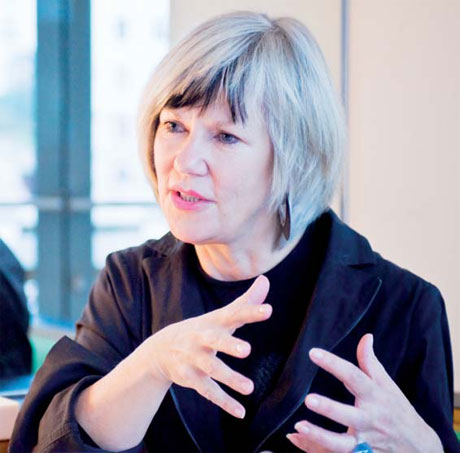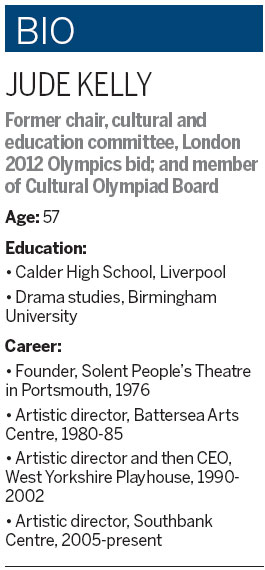London Games get cultural touch
Updated: 2012-02-10 09:38
By Andrew Moody (China Daily)
|
||||||||
|
Jude Kelly is confident London will do better than the much-criticized slot four years ago. [Nick J B Moore / For China Daily] |
Beijing opening, closing ceremonies tough act to follow, says artistic director
London Olympic bid cultural supremo Jude Kelly says staging an opening ceremony to match up to the success of Beijing four years ago is bound to be nerve-wracking.
"Look, it is the biggest cultural platform in the world. Two-thirds of the world's population tune into the opening ceremony. Wouldn't you be scared?" she asks.
Kelly, who was speaking over a breakfast of Welsh rarebit at Canteen, a restaurant under the Southbank Centre, says it is natural for many in Britain to fear some form of flop.
"That is what fear does, isn't it? It makes you think it is going to be rubbish. I am sure China was terrified because Athens did a wonderful opening ceremony. Do you remember Barcelona's opening ceremony? Absolutely sublime," she says.
Kelly, one of the leading figures in UK arts, is confident London will do better than the much-criticized slot in the closing ceremony it had at the Beijing Games, which she personally witnessed in the Bird's Nest (Olympic) stadium.
For many it just rolled out all the old clichs about Britain, featuring London red buses and footballer David Beckham, despite the initial bid being about promoting a more modern image of the country.
"I thought it didn't succeed. It was trying to do too many things all in one go, which made it look clichd, a bit hammy," she says.
"There is seven minutes a nation gets to do their bit. They always call it the graveyard slot because it is always set against what the country the Games is currently in has done," she says.
Kelly was in charge of the cultural and educational aspects of the London bid for the Games, a key plank of which was a promise the opening ceremony would demonstrate Britain's pre-eminence in theatrical production.
Some details of the planned London opening ceremony, for which she no longer has direct responsibility, are now emerging.
Directed by Danny Boyle, who was behind the Oscar-winning film Slumdog Millionaire, it will have a cast and crew of 12,000 and an underlying theme of "British humor".
It will also contain some form of tribute to the British National Health Service (NHS) and feature music by the UK band Underworld.
Stephen Daldry, the internationally-renowned theater and film director who had the film hit Billy Elliot, will also oversee the artistic vision for all of the London ceremonies.
"I am not going to second guess what Danny and Stephen are going to do. I think what you can be sure of is that you have a group of artists who are very intelligent, hugely theatrical and also filmic," she says.
Kelly, 57, is much in demand and agreed to meet early in the morning since she would be giving a talk in the northeast of England later in the day before flying out to India, where she is involved in other projects.
She also travels to China up to two or three times a year.
|
|
"I don't think I am a China expert. I believe in what the arts can do in places like China. It is a place where you can discover different ideas, you can have a sense of adventure and take risks. China at the moment seems to have an appetite for this. It wants its people to be curious," she says.
In her role as artistic director of the Southbank Centre, one of the UK's leading performance venues, she had just received a visit from officials from the Guangzhou Opera House, the new 1,800-seater venue designed by British-Iraqi architect Zaha Hadid.
"They really want to know how to create something like the Southbank Centre in Guangzhou. They wanted to know what made 22 million people walk by and 8 million actually come here last year. They want to know how to get people actually engaging like that," she says.
Kelly, who is from Liverpool, says it was the arts and wanting to be a director that finally arrested her from a somewhat wayward adolescence.
"I often say if I hadn't found a way of being creative professionally, I could possibly have gone off the rails as a lot of young people can do," she says.
Yet even studying drama at Birmingham University, one of her lecturers wanted to knock back her ambitions to direct.
"He told me that there had only been three recent women theater directors. He said one was a lesbian, one had committed suicide and the other was retired and asked me which I wanted to be," she says.
Despite the lack of encouragement, she landed her first job in the mid-1970s at the Solent People's Theatre in Portsmouth.
From there she had successful spells at the Battersea Arts Centre in London and then at the West Yorkshire Playhouse in Leeds, making it one of the UK's premier national theaters.
She was therefore a natural choice to provide the cultural input into the London Olympic bid. Her current role with the Olympics is on the board of the Cultural Olympiad, which will stage the London Festival, a series of cultural events around the time of the Games themselves.
These will include a poetry festival with a poet from every competing nation, a retrospective of the late German contemporary dance director Pina Bausch at the Barbican and a celebration of African culture.
Kelly believes this is an area where London can improve on Beijing, which while making a dramatic impact with its opening and closing ceremonies, staged only limited other cultural events at the time.
"I don't think the cultural aspects as a whole are a hard act to follow because they were very hard to find. If you went - as I did - during the Olympics, it was difficult to access culture and nothing much was published about it. There was nowhere to go," she says.
Kelly is keen to develop Chinese audiences at the Southbank Centre, which has visitors who are both Chinese tourists and expats living in the UK.
"I am working with a young woman who is a graduate of the London School of Economics and is on sabbatical but still attached to the Shanghai Grand Theater on developing Chinese audiences."
She says it is not a matter of simply staging Peking operas since there is also a demand from both Chinese and UK audiences for art that gives an insight into contemporary China.
"We do Peking Operas as a cultural interest thing. There is a big appetite, however, from audiences who want to know a lot more than that about China," she says.
The Hayward Gallery, which is part of the Southbank Centre, is to stage an exhibition by leading Chinese visual artists later this year.
Kelly says the problem many Chinese artists face is escaping the label of being Chinese rather than just being seen as world-class artists.
"They are artists who have chosen to be free of representing China. Many of them live in New York and all over the world. Yet they are Chinese. There isn't the same pressure on British artists, for example, to be British," she says.

 Relief reaches isolated village
Relief reaches isolated village
 Rainfall poses new threats to quake-hit region
Rainfall poses new threats to quake-hit region
 Funerals begin for Boston bombing victims
Funerals begin for Boston bombing victims
 Quake takeaway from China's Air Force
Quake takeaway from China's Air Force
 Obama celebrates young inventors at science fair
Obama celebrates young inventors at science fair
 Earth Day marked around the world
Earth Day marked around the world
 Volunteer team helping students find sense of normalcy
Volunteer team helping students find sense of normalcy
 Ethnic groups quick to join rescue efforts
Ethnic groups quick to join rescue efforts
Most Viewed
Editor's Picks

|

|

|

|

|

|
Today's Top News
Chinese fleet drives out Japan's boats from Diaoyu
Health new priority for quake zone
Inspired by Guan, more Chinese pick up golf
Russia criticizes US reports on human rights
China, ROK criticize visits to shrine
Sino-US shared interests emphasized
China 'aims to share its dream with world'
Chinese president appoints 5 new ambassadors
US Weekly

|

|









